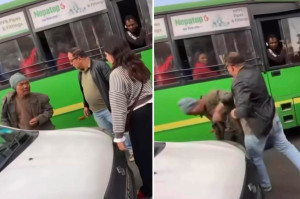Kathmandu
City covers waste pile in plastic after rains damage road to Banchare Danda
On Sunday, the Kathmandu Metropolitan City used a 40,000 square feet of plastic tarp to cover the humongous pile of rotting garbage at Teku.
Anup Ojha
Garbage has been piling up at Teku transfer station since the transport of Kathmandu’s waste to Banchare Danda remains on hold after rains made the road leading to the landfill site impassable.
On Sunday, the Kathmandu Metropolitan City used a 40,000 square feet of plastic tarp to cover the humongous pile of rotting garbage at Teku.
“The City has taken this measure because the garbage pile has started to emit foul smell, and also to prevent dogs, crows and eagles from littering,” said Sarita Rai, chief of the City’s environment department.
Sunil Lamsal, an engineer and waste management consultant at the City, said a substance called Jeevatu, which is an organic liquid manure of beneficial microbes found in natural conditions in Nepal, has been sprayed over the heap of garbage to reduce the foul smell. “It can decompose the garbage in just two days, and does not have any negative impact on human health,” Lamsal said.
According to Lamsal, it will take two more weeks to fix the road leading to Banchare Danda. “We can resume garbage disposal at the landfill site only after the road becomes motorable,” he said. “So, for now, covering the garbage pile and using Jeevatu is the safest option.”
The city has spent Rs150,000 on plastic tarp to cover the garbage at the Teku station that spreads over 45 ropani of land. Of which, around 15 ropani area is being used to deposit the garbage, while the remaining space is being used to park garbage trucks, vans and lorries.
According to Rai, given the poor road condition, only 10 to 15 lorries can pass through the road section now which means most of the city’s garbage is being stored at the transfer station in Teku. On normal days, around 150 lorries carry the garbage to the landfill site.
Every day, the 18 municipalities in Kathmandu Valley generate over 1,200 metric tons of solid waste, of which around 60 percent is generated from the Kathmandu Metropolitan City alone.
For years, Teku residents have been complaining of garbage buildup at the transfer station, and have protested against it several times. Recently, in May, they had launched a protest, padlocking the waste transfer centre.
Garbage has been a perennial problem in Kathmandu Valley. Kathmandu’s new mayor, Balendra Shah, has listed waste management as his foremost priority ever since he won the mayoral race as an independent candidate on May 26. However, the mayor and his office have yet to find a permanent solution to the city’s decades-old waste management problem.
For years, locals of Banchare Danda and Sisdole landfill sites have been protesting against the City’s dumping of garbage in the areas. After Shah took over as mayor, the locals once again resorted to protest, halting the transport of garbage. Garbage transportation to Banchare Dada resumed only after the Kathmandu Metropolitan City and the agitating residents of Sisdole and Banchare Danda reached an 18-point agreement on June 10.




 13.12°C Kathmandu
13.12°C Kathmandu.jpg)











